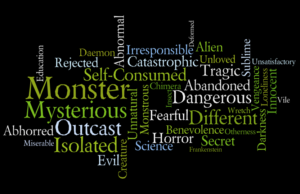
When we experience or hear about tragedy befalling our fellow beings at the hands of other humans, our knee-jerk reaction is to distance ourselves emotionally and physically from those we label “ evil.” We claim to not understand their bent for destruction, or consider ourselves different (i.e., better) because we’d never engage in that damaging behavior or give in to those violent energies. We mistakenly believe that creating a gulf between us and the “bad guys” somehow ensures we not only avoid becoming violent ourselves, but also magically minimizes our risk of being victims of vicious misfortune. However, our branding (and judging) of the “other” actually works to diminish the humanity of everyone. Truthsayers throughout history have espoused the necessity of embracing our dark sides, whether to more fully understand our weaknesses, or to learn from what these energies have to teach us. From religious prophets, to modern-day sages like psychiatrist Carl Jung, we have been encouraged to seek out our “shadow selves”, to embrace our flaws, fears and ignominious urges with compassion and an honest assessment. Being human involves both the noble and the basic, the honor of sacrifice and the pain of selfishness. When we deny what scares us, we feed it with the power to control us. Acknowledging our darkness doesn’t absolve us of our responsibility to choose NOT to act on impulses that are destructive to ourselves or others. But accepting all sides of us does bring the gift of deeper insight, more compassion for ourselves and others, and a willingness to wade in the grayest waters of life — the sea of choices, behaviors, attitudes and beliefs that are never “all good” or “all bad.” This cloudy ocean is where most of life is lived, and learning to face our
demons is our best hope for growth, flexibility, empathy and resilience —the very characteristics we need most to survive tragedy, transform it, and learn how to limit its impact on our world.
